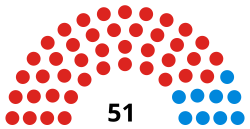Greenwich London Borough Council
| Greenwich London Borough Council | |
|---|---|
| Type | |
| Type | |
| Leadership | |
|
Mayor
|
Jim Gillman
|
| Structure | |
| Seats | 51 councillors in 17 wards |
 |
|
|
Political groups
|
Executive (42)
Opposition (9)
|
| Elections | |
| First past the post | |
|
Last election
|
22 May 2014 |
|
Next election
|
2018 |
| Meeting place | |
| Woolwich Town Hall | |
| Website | |
| www |
|
Executive (42)
Opposition (9)
Greenwich London Borough Council is the local authority for the Royal Borough of Greenwich in Greater London, England. It is a London borough council, one of 32 in the United Kingdom capital of London. Greenwich is divided into 17 wards, each electing three councillors. The council was created by the London Government Act 1963 and replaced two local authorities: Greenwich Metropolitan Borough Council and Woolwich Metropolitan Borough Council. The council meets in Woolwich Town Hall.
There have previously been a number of local authorities responsible for the Greenwich area. The current local authority was first elected in 1964, a year before formally coming into its powers and prior to the creation of the London Borough of Greenwich on 1 April 1965. Greenwich London Borough Council replaced Greenwich Metropolitan Borough Council and Woolwich Metropolitan Borough Council.
It was envisaged through the London Government Act 1963 that Greenwich as a London local authority would share power with the Greater London Council. The split of powers and functions meant that the Greater London Council was responsible for "wide area" services such as fire, ambulance, flood prevention, and refuse disposal; with the local authorities responsible for "personal" services such as social care, libraries, cemeteries and refuse collection. This arrangement lasted until 1986 when Greenwich London Borough Council gained responsibility for some services that had been provided by the Greater London Council, such as waste disposal. Greenwich became an education authority in 1990. Since 2000 the Greater London Authority has taken some responsibility for highways and planning control from the council, but within the English local government system the council remains a "most purpose" authority in terms of the available range of powers and functions.
...
Wikipedia
